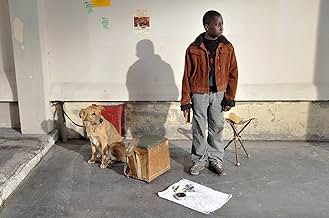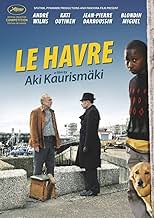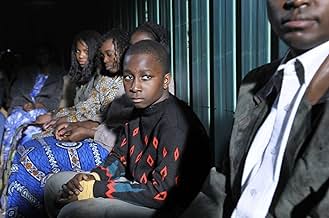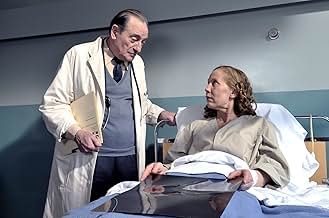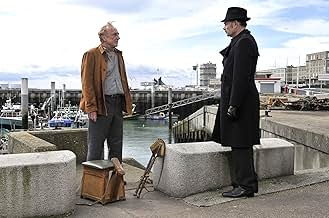IMDb-BEWERTUNG
7,2/10
24.747
IHRE BEWERTUNG
Als ein afrikanischer Junge mit einem Frachtschiff die Hafenstadt Le Havre erreicht, bekommt ein alternder Schuhputzer Mitleid und nimmt das Kind in seinem Haus auf.Als ein afrikanischer Junge mit einem Frachtschiff die Hafenstadt Le Havre erreicht, bekommt ein alternder Schuhputzer Mitleid und nimmt das Kind in seinem Haus auf.Als ein afrikanischer Junge mit einem Frachtschiff die Hafenstadt Le Havre erreicht, bekommt ein alternder Schuhputzer Mitleid und nimmt das Kind in seinem Haus auf.
- Regie
- Drehbuch
- Hauptbesetzung
- Auszeichnungen
- 15 Gewinne & 34 Nominierungen insgesamt
Quoc Dung Nguyen
- Chang
- (as Quoc-Dung Nguyen)
Little Bob
- Little Bob
- (as Roberto Piazza)
Empfohlene Bewertungen
These days it seems that French films predominantly fit into one of two categories: Smug, over long and preachy, such as Rust and Bone or Little White Lies. Or they produce deeply involving but simplistic stories containing the most genuine heartfelt emotion such as Amour (in French, therefore French) or The Kid with a Bike. I am happy to say that Le Havre falls in the latter group. In fact the story here is one of pure simplicity and the tone of the film contains nothing but genuine optimism towards the theme of human compassion. That is it, this film has no ulterior motive or no gimmicks, and it is a very simply and extremely involving story based around that one simple theme. However, this film is not just a tribute to human compassion, but contained within it are tributes to the history of cinema that are quite simply a joy to experience. When I say that, the use of music as well the way certain scenes are lit pay a respectful tribute to films of the 40s and 50s throughout the narrative.
This is not to say that this film is not without its realism, Marx and his neighbours all live a humble life bordering on poverty. The plight of Idrissa is unenviable and there is an honest depiction of a refugee camp just outside Calais. However, the theme of Le Havre is not that life is simply good, that would be naive. It is how these characters deal with life and the situations that it presents. Of course it would be so easy to fall into to the trap of patronising and borderline preachy cliché here, but this never happens due to the genuine feeling of honesty depicted throughout the narrative. Every character is presented very honestly with all their flaws quite clear to see, but it is their ability for natural compassion that drives the narrative forward. By the time Le Havre reaches its very satisfying conclusion where there are no loose ends, it is difficult not to feel that not only have you been entertained, but also enlightened.
This is not to say that this film is not without its realism, Marx and his neighbours all live a humble life bordering on poverty. The plight of Idrissa is unenviable and there is an honest depiction of a refugee camp just outside Calais. However, the theme of Le Havre is not that life is simply good, that would be naive. It is how these characters deal with life and the situations that it presents. Of course it would be so easy to fall into to the trap of patronising and borderline preachy cliché here, but this never happens due to the genuine feeling of honesty depicted throughout the narrative. Every character is presented very honestly with all their flaws quite clear to see, but it is their ability for natural compassion that drives the narrative forward. By the time Le Havre reaches its very satisfying conclusion where there are no loose ends, it is difficult not to feel that not only have you been entertained, but also enlightened.
He's one of the directors (very few) there you recognize who's made the movie just after a couple of seconds. Kaurismäki has a tender view on shabby environments and shabby people. It has suited his Finland conception very well.
But it functions also in France and Le Havre, there you meet this shoe-polisher who tries to help a refugee boy. Not just the shoe-polisher, all working class people do.
It's a little miracle like every film in a sort of way is everywhere, but Kaurismäki takes it on without shame. And his environments and his tenderness seem to be universal. France is like Finland and the rest of the world.
But it functions also in France and Le Havre, there you meet this shoe-polisher who tries to help a refugee boy. Not just the shoe-polisher, all working class people do.
It's a little miracle like every film in a sort of way is everywhere, but Kaurismäki takes it on without shame. And his environments and his tenderness seem to be universal. France is like Finland and the rest of the world.
Like every fairy-tale, this film by Aki Kaurismaki is unbelievable, but this apparent fake doesn't hide a sad reality behind the good intentions of the simple people that help the illegal immigrant child to arrive finally to London, wherein we couldn't predict what kind of life waits for him. A slow rhythm, (some scenes seem like stills), and a brilliant and strong color that contribute to the atmosphere of unreality, the frustration to the normal expectations of the viewers that are carried to imagine the worst, and receive on the contrary the sudden impact of the best, don't prevent to bring to the conscience the images of the cruel world that surrounds the miracle of solidarity that saves, perhaps momentarily, just one of the hundred persecuted. The bad and the good boys are generally discovered by the camera, which leaves, significantly, in off the figure of the pitiless chief of policy, and introduces in darkness the figure of the denouncer. Le Havre is an optimist movie with a very dubious happy end.
(Read the full review at http://nickplusmovies.blogspot.com)
I started off my experience at this year's Toronto International Film Festival with Aki Kaurismäki's "Le Havre", a rather obscure, small production that was competing for the Palme d'Or at Cannes (it was Terrence Malick's "The Tree of Life" that was the big winner). The question is: Did I start off on the right foot? Read on to find out...
"Le Havre" centers on an elderly, working-class shoe shiner named Marcel Marx (played by André Wilms), living with his loving wife Arletty (Kati Outinen) in the French port city of... Le Havre. Although his profession only leaves him with enough money to get by, he never gives up hope and always finds great joy and warmth in all the people in his life-- be it his friendly, selfless, next-door neighbor or the kind owner of the local bar. Marcel's life takes a bit of a turn when he must send his ill wife to the hospital, hoping she will get better soon. But that's not it-- soon after, when he finds himself alone, eating a sandwich at the harbor, he discovers a young African boy named Idrissa (Blondin Miguel) hiding in the water. Marcel befriends him and learns that he had been hiding with many other illegal immigrants in a shipping container, with hopes of arriving in London to meet up with his aunt. The old man voluntarily goes out of his way to keep him away from authorities and completely out of sight, but soon, this situation quickly transforms into a cat-and-mouse game, lead by the persistent, intimidating, wolf- like police inspector Monet (Jean-Pierre Darroussin).
With its simplistic plot, clearly defined characters, and inviting setting, this film has all the qualities and characteristics of a great short film-- if you don't count its feature-length runtime. Is this a bad thing? Hardly! I find that this makes the film all the more absorbing and enjoyable, though slow in progression at times and thus able to make your average modern-day moviegoer lose interest. But I still believe that sometimes, it's nice to just sit down and follow a naturally flowing, straightforward story, when most of the movies you see today are flashy and overly stimulating to the point where they bore you. "Le Havre" is something refreshingly different, for a change.
Rarely do films combine comedy with drama in such a natural, uncontrived way. With this film, Aki Kaurismäki proves to be one of the few working directors able to pull off a mixture of dark, ironic, and deadpan humor while maintaining the same upbeat, cheerful, and optimistic tone throughout the entire film. A great example of this guy's exemplary sense of humor is the opening scene of the film, where we see Marcel going around with his shoe shining materials, looking for a paying customer. He finally lucks out when he approaches a suspicious looking type holding a suitcase in his hand. As he shines this man's shoes, we see two other mysterious figures watching from a distance. It's clear that something's up. When Marcel finishes his job, the man pays him and quickly tries to escape. But it's too late; we hear gunshots, a tire squeal, and a scream as the camera lingers on Marcel, whose facial expression remains pleasant. He simply says: "Luckily he had time to pay.". Of course, since it's more of a visual gag, it's much funnier when you see it for yourself. Having said that, there's no denying that this film has very smart comedic elements.
What I love just as much-- if not, more-- about this little film is how authentic and down-to-earth the characters are in their interactions. Every scene is made into such an accurate portrait of life thanks to all of the real, human performances from the entire cast of lesser-known actors. The only thing that threw me off was how the couple of Finnish actors in the film let their accents slip through as they were speaking French. But this would be barely noticeable for those of you who don't speak either one of these languages.
Although this film is Finnish, it's obvious that it's shot on location in France. I was breathless as I got to admire the beauty of the ocean and the quaint coziness of the old city buildings. Sadly, this is the closest I've ever gotten to visiting France! No wonder these sights took me away.
In sum, Aki Kaurismäki's "Le Havre" is a simple, human tale that remains light and pleasant while brushing on topics of illegal immigration and the illness of a loved-one. It's a soulful film that mixes smart humor with true emotion, without ever feeling artificial. I recommend looking for this hidden gem. You might just like it.
I started off my experience at this year's Toronto International Film Festival with Aki Kaurismäki's "Le Havre", a rather obscure, small production that was competing for the Palme d'Or at Cannes (it was Terrence Malick's "The Tree of Life" that was the big winner). The question is: Did I start off on the right foot? Read on to find out...
"Le Havre" centers on an elderly, working-class shoe shiner named Marcel Marx (played by André Wilms), living with his loving wife Arletty (Kati Outinen) in the French port city of... Le Havre. Although his profession only leaves him with enough money to get by, he never gives up hope and always finds great joy and warmth in all the people in his life-- be it his friendly, selfless, next-door neighbor or the kind owner of the local bar. Marcel's life takes a bit of a turn when he must send his ill wife to the hospital, hoping she will get better soon. But that's not it-- soon after, when he finds himself alone, eating a sandwich at the harbor, he discovers a young African boy named Idrissa (Blondin Miguel) hiding in the water. Marcel befriends him and learns that he had been hiding with many other illegal immigrants in a shipping container, with hopes of arriving in London to meet up with his aunt. The old man voluntarily goes out of his way to keep him away from authorities and completely out of sight, but soon, this situation quickly transforms into a cat-and-mouse game, lead by the persistent, intimidating, wolf- like police inspector Monet (Jean-Pierre Darroussin).
With its simplistic plot, clearly defined characters, and inviting setting, this film has all the qualities and characteristics of a great short film-- if you don't count its feature-length runtime. Is this a bad thing? Hardly! I find that this makes the film all the more absorbing and enjoyable, though slow in progression at times and thus able to make your average modern-day moviegoer lose interest. But I still believe that sometimes, it's nice to just sit down and follow a naturally flowing, straightforward story, when most of the movies you see today are flashy and overly stimulating to the point where they bore you. "Le Havre" is something refreshingly different, for a change.
Rarely do films combine comedy with drama in such a natural, uncontrived way. With this film, Aki Kaurismäki proves to be one of the few working directors able to pull off a mixture of dark, ironic, and deadpan humor while maintaining the same upbeat, cheerful, and optimistic tone throughout the entire film. A great example of this guy's exemplary sense of humor is the opening scene of the film, where we see Marcel going around with his shoe shining materials, looking for a paying customer. He finally lucks out when he approaches a suspicious looking type holding a suitcase in his hand. As he shines this man's shoes, we see two other mysterious figures watching from a distance. It's clear that something's up. When Marcel finishes his job, the man pays him and quickly tries to escape. But it's too late; we hear gunshots, a tire squeal, and a scream as the camera lingers on Marcel, whose facial expression remains pleasant. He simply says: "Luckily he had time to pay.". Of course, since it's more of a visual gag, it's much funnier when you see it for yourself. Having said that, there's no denying that this film has very smart comedic elements.
What I love just as much-- if not, more-- about this little film is how authentic and down-to-earth the characters are in their interactions. Every scene is made into such an accurate portrait of life thanks to all of the real, human performances from the entire cast of lesser-known actors. The only thing that threw me off was how the couple of Finnish actors in the film let their accents slip through as they were speaking French. But this would be barely noticeable for those of you who don't speak either one of these languages.
Although this film is Finnish, it's obvious that it's shot on location in France. I was breathless as I got to admire the beauty of the ocean and the quaint coziness of the old city buildings. Sadly, this is the closest I've ever gotten to visiting France! No wonder these sights took me away.
In sum, Aki Kaurismäki's "Le Havre" is a simple, human tale that remains light and pleasant while brushing on topics of illegal immigration and the illness of a loved-one. It's a soulful film that mixes smart humor with true emotion, without ever feeling artificial. I recommend looking for this hidden gem. You might just like it.
In 1992, Finnish director Aki Kaurismaki directed LA VIE DE BOHEME, where he transplanted to Paris for a story of impoverished, failed artists on the cusp of society. A funny, sad film about art, love, and loss. Nearly twenty years later, Kaurismaki returns to France in LE HAVRE; while some of the humor remains, its story of the impoverished and dispossessed is even more affecting.
LA VIE... showed a painterly visual sense, all the more amazing that it was filmed in black and white. LE HAVRE boasts an equally striking visual sense, with scenes that seem to glow. That said, other elements of the production are less convincing - and at times. almost embarrassing. (For example, a group of black refugees are locked in a container crate for almost a week; when it's opened, no one's hungry or even concerned, and several are freshly shaved.)
LE HAVRE sets up the camera in a stationary spot - much like an old silent - giving the film a real resonance. But this affection for older filmmaking will be familiar for Kaurismaki fans; his silent, black and white JUHA uses the same minimalistic approach, with good results.
If you're willing to forgive certain production details and the dependence on melodrama, LE HAVRE is a feel-good story of how those of modest means can help those in desperate straits. (LE HAVRE itself was directed under low budget.) The film's humanism is its saving grace. While the filmmaking is occasionally awkward, there's still a lot to be admired here.
LA VIE... showed a painterly visual sense, all the more amazing that it was filmed in black and white. LE HAVRE boasts an equally striking visual sense, with scenes that seem to glow. That said, other elements of the production are less convincing - and at times. almost embarrassing. (For example, a group of black refugees are locked in a container crate for almost a week; when it's opened, no one's hungry or even concerned, and several are freshly shaved.)
LE HAVRE sets up the camera in a stationary spot - much like an old silent - giving the film a real resonance. But this affection for older filmmaking will be familiar for Kaurismaki fans; his silent, black and white JUHA uses the same minimalistic approach, with good results.
If you're willing to forgive certain production details and the dependence on melodrama, LE HAVRE is a feel-good story of how those of modest means can help those in desperate straits. (LE HAVRE itself was directed under low budget.) The film's humanism is its saving grace. While the filmmaking is occasionally awkward, there's still a lot to be admired here.
Wusstest du schon
- WissenswertesThe character Marcel Marx, played by André Wilms, first appears in Das Leben der Boheme (1992). Jean-Pierre Léaud also appears in both films, but as different characters.
- Zitate
Marcel Marx: L'argent circule au crepuscule.
- VerbindungenFeatured in At the Movies: Cannes Film Festival 2011 (2011)
- SoundtracksMatelot
Performed by The Renegades
Top-Auswahl
Melde dich zum Bewerten an und greife auf die Watchlist für personalisierte Empfehlungen zu.
- How long is Le Havre?Powered by Alexa
Details
Box Office
- Budget
- 3.850.000 € (geschätzt)
- Bruttoertrag in den USA und Kanada
- 611.709 $
- Eröffnungswochenende in den USA und in Kanada
- 26.363 $
- 23. Okt. 2011
- Weltweiter Bruttoertrag
- 12.959.706 $
- Laufzeit1 Stunde 33 Minuten
- Farbe
- Seitenverhältnis
- 1.85 : 1
Zu dieser Seite beitragen
Bearbeitung vorschlagen oder fehlenden Inhalt hinzufügen


